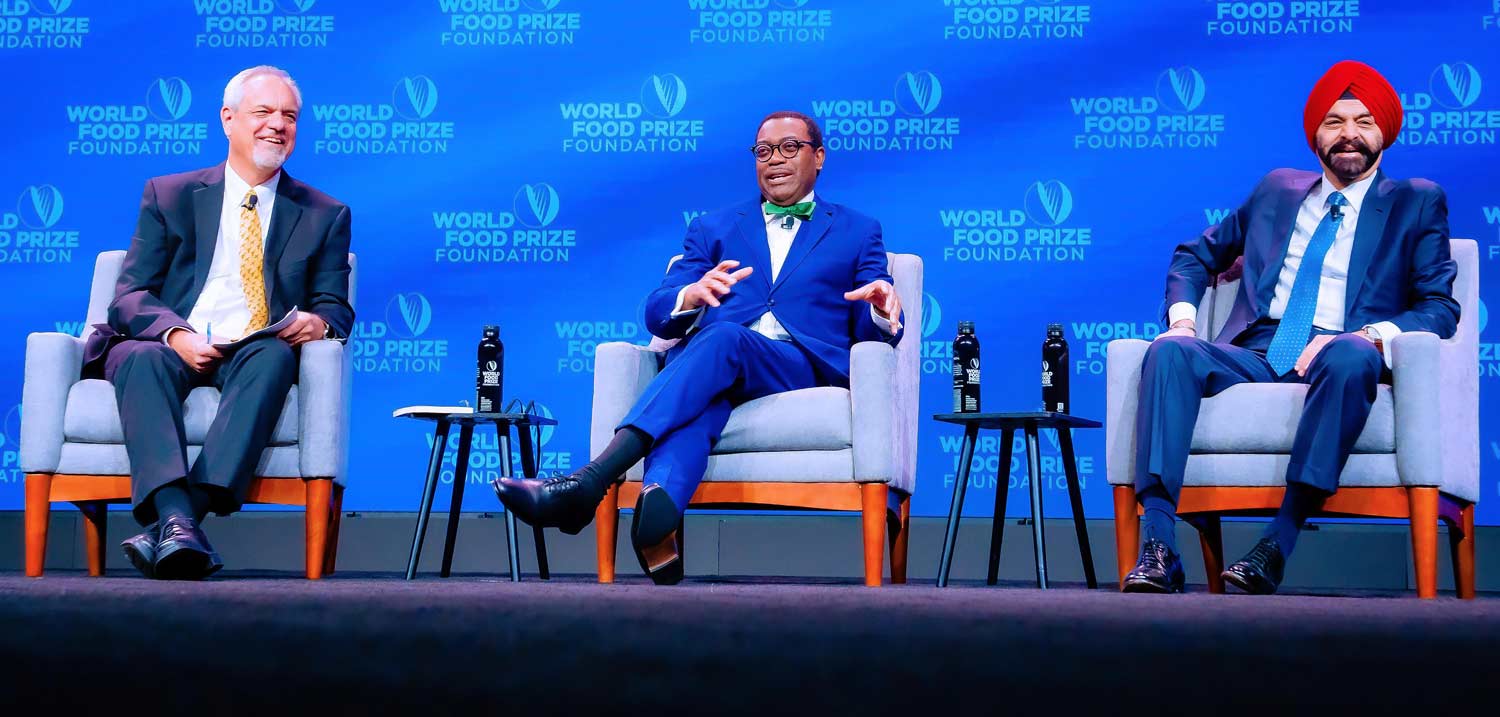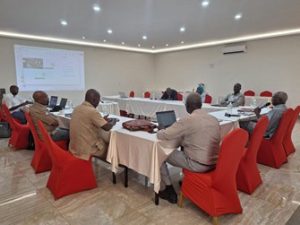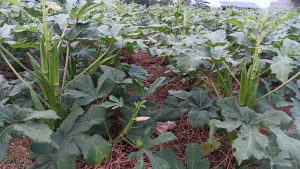Leaders acknowledge TAAT as a bold initiative to achieve a hunger-free world

The 2024 Borlaug Dialogue and 2024 World Food Prize Ceremony which convened under the theme “Seeds of Opportunity: Bridging Generations and Cultivating Diplomacy,” echoed Dr. Norman Borlaug’s enduring vision of breaking barriers and transcending boundaries for global food security.
Held each October in conjunction with the presentation of the World Food Prize, this year’s “Borlaug Dialogue” brought together over 1,000 participants from more than 50 countries comprising international experts, policy leaders, business executives and farmers to address cutting-edge issues in global food security and nutrition.
The three-day symposium provided a global platform to learn about Technologies for African Agricultural Transformation (TAAT)‘s transformational drive and commitment to food systems resilience in Africa
During the main plenary sessions at the Borlaug Dialogue, TAAT was recognised by world leaders as a key initiative of the African Development Bank that is rapidly catalysing food systems transformation across
These sessions include those on Achieving a Hunger-Free World by Dr Akin Adesina, AfDB President and Ajay Banga, World Bank President, Bold Measures to Feed Africa, the Africa Agriculture Dialogue and breakout Sessions on the Vision for Adapted Crops and Soils and the role of root, tuber, and banana (RTB) crops in promoting food security, enhancing climate resilience, and alleviating poverty.
Achieving a hunger-free world
In a powerful opening to the World Food Prize Foundation 2024 Norman E. Borlaug International Dialogue, the president of the African Development Bank Group Dr. Akinwumi Adesina and his counterpart at the World Bank Ajay Banga, stressed the need for more global action against hunger, a goal slipping further away due to the combined effects of conflict, economic challenges and climate change.
The two leaders were guest speakers at the opening plenary on Tuesday 29 October, entitled “Achieving a Hunger-Free World,” at which they reiterated their institutions’ commitments to ending food insecurity in Africa, highlighting innovative partnerships and financial solutions.
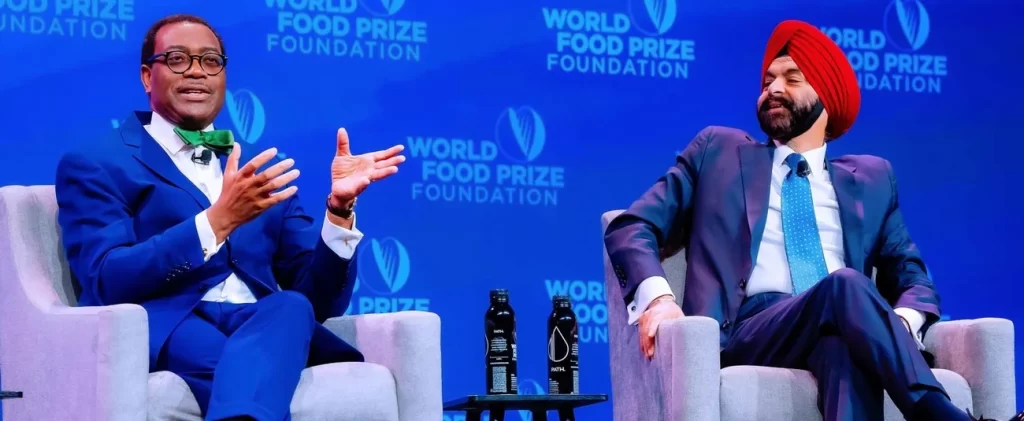
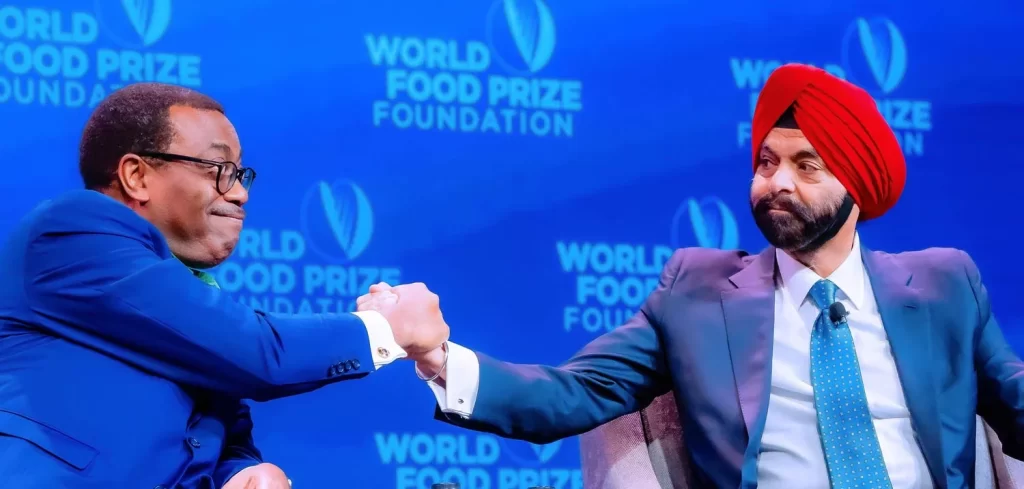
“There is nothing more important than feeding the world. Multilateral Development Banks (MDBs) play an important role in that,” Adesina declared. He stressed the crucial role of international financial institutions in helping achieve this task.
Interviewed by Roger Thurow, senior fellow for global agriculture at the Chicago Council on Global Affairs, Adesina and Banga discussed the transformative actions from MDBs in meeting Africa’s annual $1.3 trillion development needs.
Initiatives to feed the world
Both leaders highlighted the urgency of engaging Africa’s youth in agriculture. According to them, the African Development Bank’s Technologies for African Agricultural Transformation (TAAT), the “Enable Youth” programme and the World Bank’s focus on youth employment initiatives, reflect a shared commitment to harnessing Africa’s demographic dividend for agricultural transformation and economic prosperity.
“If we don’t put finance behind young people’s ideas, that’s the biggest risk,” Adesina warned.
Adesina also underlined the importance of partnerships such as the G20’s Global Alliance against Hunger and Poverty of which the African Development Bank and the World Bank are partnering. The campaign will see SDRs channeled through MDBs to fight hunger.
Addressing the topic of climate change and farmers’ livelihoods Banga noted that in Africa, only 4% of global climate financing goes to agriculture.
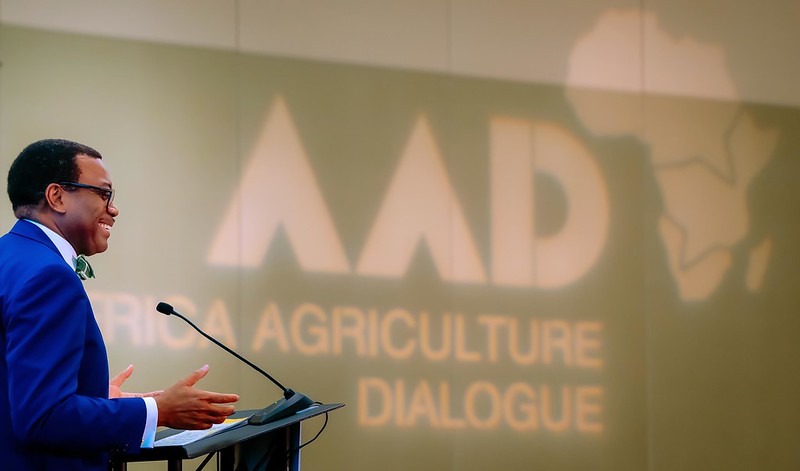
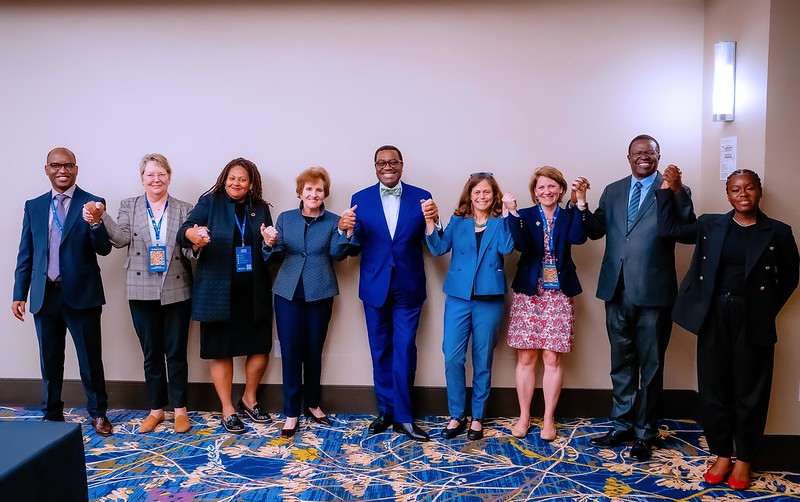
He stressed the need for scalable solutions to support Africa’s small farmers. “The focus must be on scale and ecosystems,” he said, pointing to the World Bank’s efforts to enhance farmers’ access to energy, internet, and credit guarantees, creating a comprehensive support network.
Banga said the World Bank is highlighting the demographic dividend of Africa’s youth by making job creation a specific outcome of all its development work, along six specific pillars.
Tanzania at 128% food security
Tanzania is setting new benchmarks in food self-sufficiency across Africa, raising hope that the fight against hunger and malnutrition on the continent is achievable. President Samia Suluhu Hassan of Tanzania said her country had reached 128 percent food security and is now exporting surplus to neighbouring countries.
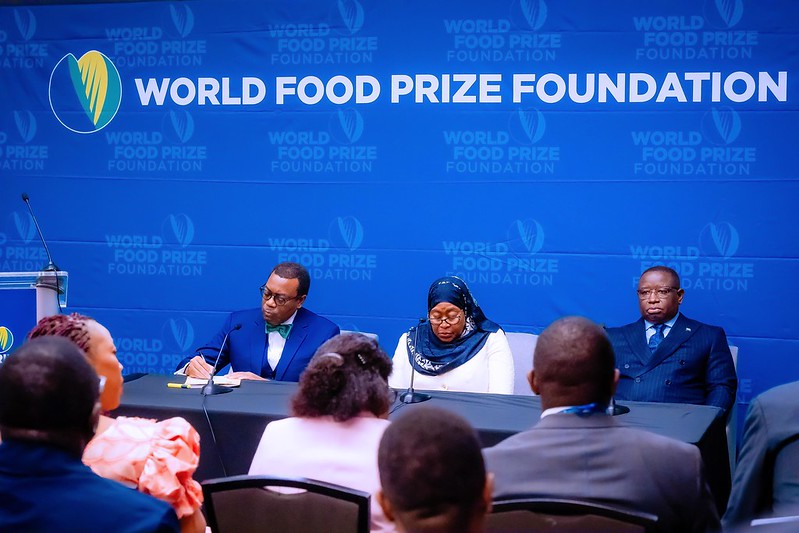
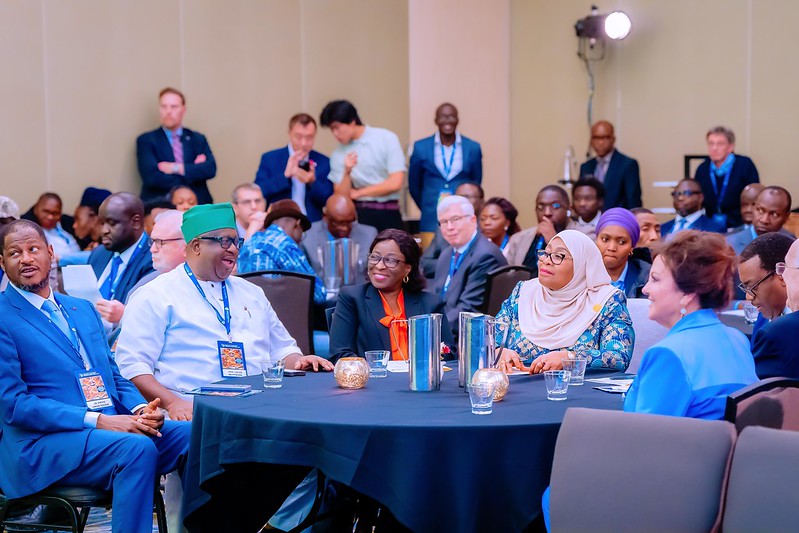
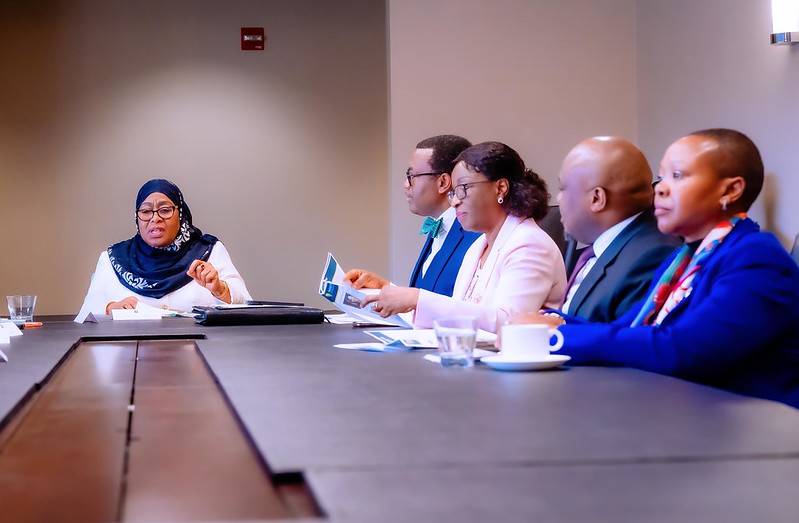
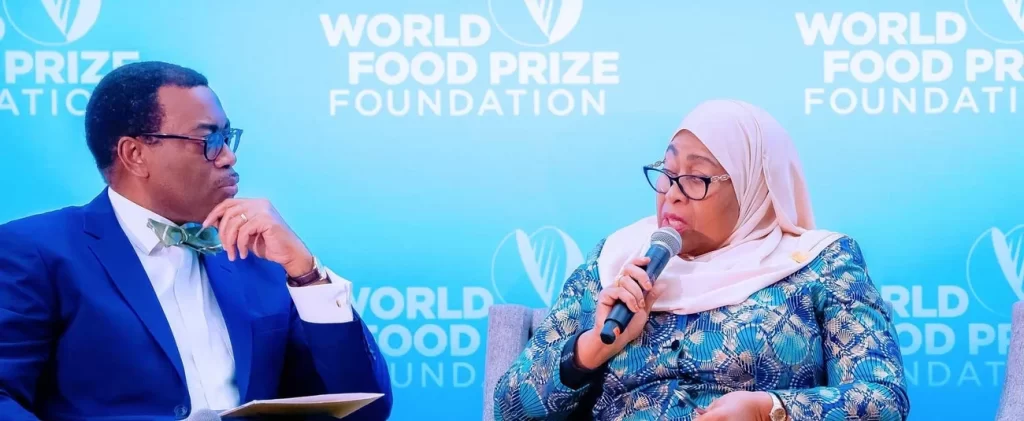
The president stated this during a high-level session at the World Food Prize Norman E. Borlaug International Dialogue in Iowa, moderated by the president of the African Development Bank Group, Dr Akinwumi Adesina.
The session, entitled “Bold Measures to Feed Africa,” also featured the President of Sierra Leone, Julius Maada Bio.
President Suluhu Hassan told a packed auditoriumthat after achieving food sufficiency, “we are now working on quality, accessibility, and affordability, and how to minimize post-harvest losses, and the bank’s support through the TAAT programme will be critical.”
Adesina praised President Suluhu Hassan’s leadership and strong political will for Tanzania’s success. He said the growing commitment of other African nations, underscores the continent’s readiness for large-scale investment in agriculture and food production.
He recalled how the African Development Bank’s 2023 Dakar 2 Food Summit ignited commitment across Africa for country-specific food and agriculture compacts. The summit, co-hosted by the government of Senegal and the African Union, was attended by 34 African Heads of State and Government. It has mobilized more than $72 billion to date.
President Suluhu Hassan said Tanzania left Dakar 2 summit with a signed compact and determination to implement increasing productivity as well as the political will to create institutions and support structures for its farmers.
“We realized that not investing in agriculture is much more costly than investing in the sector,” she said.
Tanzania has broken another record by becoming a processor and net exporter of cashew nuts, which for nearly all African countries, are processed in Asia. The country has also succeeded in rural electrification with nearly 100 percent of its 12,300 villages with electricity, President Suluhu Hassan said.
Backed by investment from the African Development Bank, Tanzania’s Creating jobs for Youth and Women programme is targeting the country’s 65% youth population with training in farming, agriculture, livestock and crop farming.
The Tanzanian leader said each youth is given 10 acres of land and is supported by training, already 11,000 have benefited and this year’s harvest has begun. “We thank the African Development Bank for supporting that program,” she said.
Feed Salone as a bold initiative to feed Sierra Leone
Joining Adesina on stage, President Bio of Sierra Leone shared his country’s success with the Feed Salone program, which has cut rice imports by 20 million tons and spurred agricultural productivity.
Until then the nation had not paid enough attention to food security and Bio said he had focused on education during his first term. “Agriculture is the basis of development,” President Bio stated.
The Feed Salone programme has helped boost agricultural productivity to feed the nation and to enable them export. “Already we have reduced rice imports by 20 million tons,” he said. “With support from the TAAT programme, the Sierra Leone Seed Roadmap has attracted donor support to the tune of $70 million,” he added.
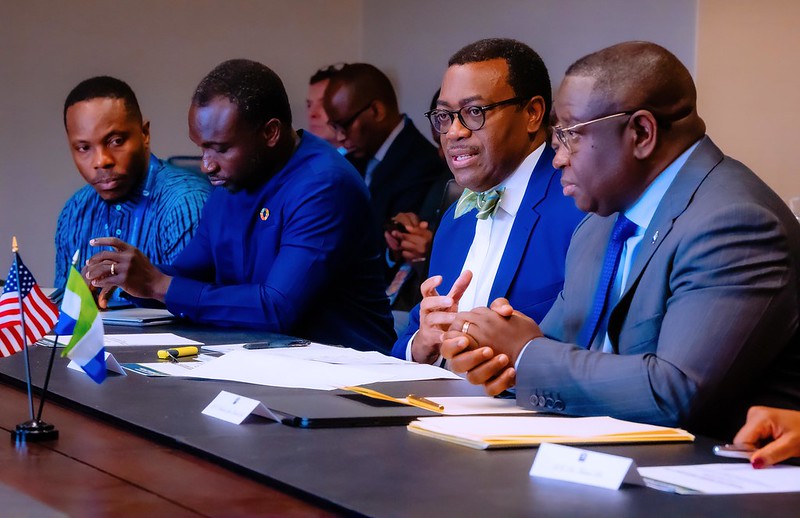
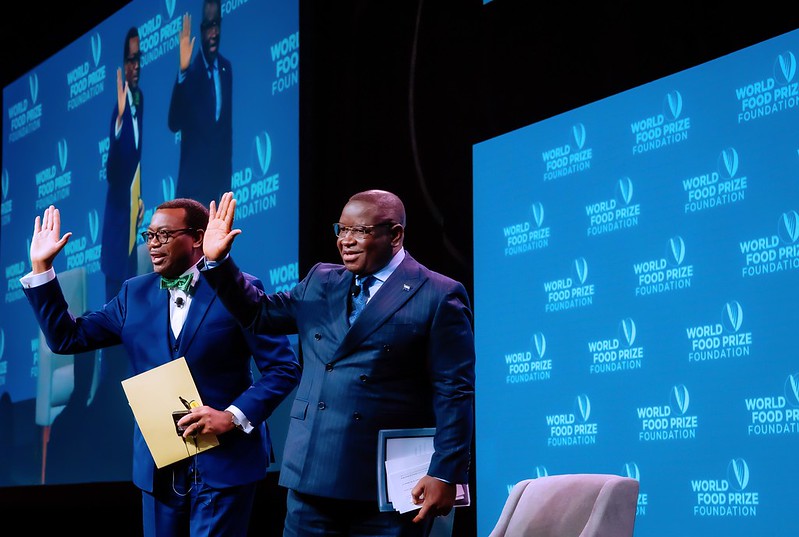
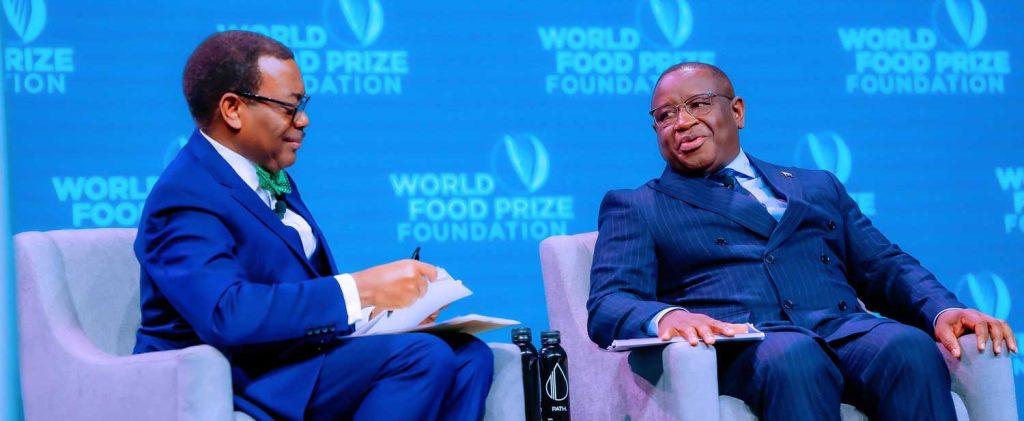

“We are here to share the Sierra Leone story and invite investors. We are an ambitious nation and want to succeed to attract investors,” President Bio said.
Adesina highlighted the African Development Bank’s efforts to reshape global perceptions of Africa and drive investment in critical sectors like agriculture.
He said the event and the Africa Dialogue, also hosted by the African Development Bank in Iowa, was intended to break stereotypes and showcase Africa’s potential, a continent that is home to 65% of the world’s remaining arable land and has the technology to turn Africa into a global food basket.
“This is why we bring African leaders here so you can hear from them directly,” Adesina said.
Adesina recalled the words of Norman E. Borlaug to him shortly before his death in 2009 at 95 years old.
“He told me keep on scoring goals for Africa,” Adesina said. “If you are not investing in Africa, what are you doing?”
TAAT equally participated in strategic meetings organised by USAID, BMGF, CGIAR, Inter-American Institute for Cooperation on Agriculture (IICA), Alliance to End Hunger, and the Millennium Challenge Corporation (MCC) at the dialogue. Informational and knowledge materials on TAAT were equally distributed at the joint CIP-TAAT booth and the AfDB Delegation office.
Established in 2018 as a central pillar of the African Development Bank’s Feed Africa strategy, TAAT represents a transformative initiative to reverse the trend of declining food productivity in Africa through the scaling of modern food production technologies to 40 million farmers across Africa, focusing on supporting young people and women in low-income regions.
TAAT has scaled up the dissemination of heat-tolerant wheat varieties, drought-tolerant maize, high-yielding rice, cassava, high-iron bean, sorghum, millet, orange-fleshed sweetpotato varieties and high-quality livestock breeds, and fingerlings to more than 12 million farmers, boosting crop production by an estimated 25 million tonnes. This increase in food production is a testament to the programme’s effectiveness in enhancing agricultural productivity across the continent.
TAAT acquires cutting-edge technologies from developers and agricultural research institutions led by the CGIAR for several agricultural value chains covering crops, livestock and fisheries, vets them for scaling readiness and integrates them into its electronic technology catalogue.
TAAT engages governments to integrate proven technologies into their large-scale agricultural investment programmes and partner with the private sector to commercialise them.
Recent Stories
Related Stories
- African Development Bank approves phase II of TAAT programme
- TAAT wins National Association of Black Journalists Salute to Excellence Award
- Tanzania: TAAT and partners Showcase Scalable Solutions for Africa’s Grain Challenges
- How TAAT Orange-fleshed sweet potatoes sparked a wellness movement
- TOGO: TAAT underscores technologies and innovations for Integrated management of plant and animal pests and diseases


